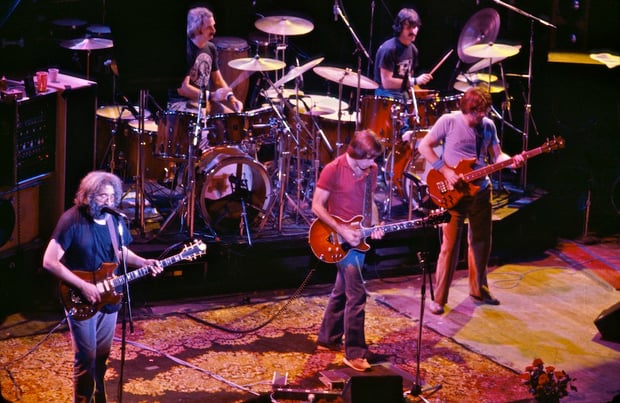 Image via Chris Stone on flickr.com
Image via Chris Stone on flickr.com
The Grateful Dead have long been a topic of judgment over the years. Pictures of flower-laden hippies twirling around barefoot while their "cult leader," Jerry Garcia, noodles away for eternity is often the image popular culture conveys of the band. For many fans, their scene is a community-oriented experience akin to family. The music is transcendental, emotional, and ever changing.
Is it for everyone? No, and that's fine. Music is subjective, but success is not. There's no question that the Grateful Dead have found success in their outlandishly long career of over 30 years, with more than 35 million albums sold worldwide, so they must have been doing something right. Personal opinions aside, there are many lessons every musician can learn from the Grateful Dead. Here are just a few.
1. Reward your best fans
Good customer service is a trait of business that's fairly common these days. Fierce competition from international competitors gave rise to the "customer first" mentality, which came about mostly in the 1980s. Unbeknownst to corporate America, the Grateful Dead have been doing that for years.
They established a hotline that would alert their biggest fans ahead of schedule in regards to tour announcements. Those who called in would get reserved seats (some of the best in the venue), capped price of tickets, and delivery to their doors. No waiting in line for hours in the cold. Obviously, they had the infrastructure to do so, but the message is really what's important here: Recognize your biggest fans, and treat them well.
[6 Ways to Build Personal Relationships With Fans That You Probably Haven't Tried]
2. Embrace free advertising
We get it. The music you create is your baby. You wouldn't give your beautiful child away for free, would you? Wouldn't that lower the value of your art? Not necessarily. The theory of supply and demand works well on a physical level (i.e., there's a shortage of oil, so the price goes up) but not so much on a creative one. You won't add value to your music by keeping it for yourself and the highest bidder. The more it's available, the more familiar it becomes, and the more value it'll have. The Grateful Dead embraced this by giving away their live performances. Every show was taped and traded, allowing their art to spread like wildfire.
Start small. If you give some songs away to 10 people, then they'll share it with other people and so on. Soon, more people will know you, and more people will want to listen.
3. Transparency demands forgiveness
The Grateful Dead aren't necessarily known for their tight musical performances. The whole nature of their music was embracing the unexpected. Risks were taken, mistakes were made, and the band played on. The fans were aware of this; in fact, it's one of the major draws of the genre. It might sound funny, but people went to their shows expecting (and perhaps even hoping) for imperfection.
I'm not saying that you should slop up your musical act, but there's a lesson here: If you're up front with your fans about your "business model," then they'll be quick to forgive you when you mess up. Be transparent, let everyone know what your intentions are, and a loyal fanbase will surely follow.
4. Diversify
You love punk music. Your best friend loves punk music. He knows a drummer who absolutely loves punk music. What do you get? Probably a pretty decent punk band. Is there anything wrong with that? Not at all, but there are thousands of pretty decent punk bands out there. If you truly want to stand out, for your music to peak the interest of listeners, it has to sound fresh. Members of the Grateful Dead came from all different kinds of cultural and musical backgrounds. What they ended up with was a conglomeration of unique ideas and sounds that can never be replicated.
Be open to new concepts that may deviate from your norm. You never know the results a certain mixture may produce until you try.
5. Use technology to your advantage
This is perhaps more relevant now than ever before. The Grateful Dead were at the forefront of sound innovation. What's commonplace for live performances now was revolutionized by the Dead and their crew. This kept their shows on the cutting edge, even if their old songs were not.
You don't have to reinvent the wheel here, but with all the advancements in technology, there's no excuse to not do some research on how to use technology to better your band. Whether it's utilizing apps, analyzing trends, or simply buying new gear, taking advantage of technology will only help.
6. Create a memorable brand
It's okay – everyone's been in a band with a thoughtless, unmemorable name. Heck, even the Grateful Dead were once called the Warlocks. You want a name that everyone will remember. Along with that, you want images to associate with that brand. This is something the Dead were masters at. From the "Dancing Bears" to the "Steal Your Face" logo, there are numerous strong visuals that come to mind when you think of their music.
When thinking of a name, make it something unique. Do some research beforehand. Odds are, if your proposed band name comes up on the first three pages of Google, it isn't very original. Once you have a unique name to build off of, the coinciding ideas for merchandise will follow suit. Don't be afraid to let fans chip in with concepts, either.
[8 Tips for a Strong Band Name]
Anthony Cerullo is an avid keyboard player, writer, and world traveler. He has spent the past few years touring the US in bands, and now finds himself exploring the musical spectrum that various countries of the world offer.


